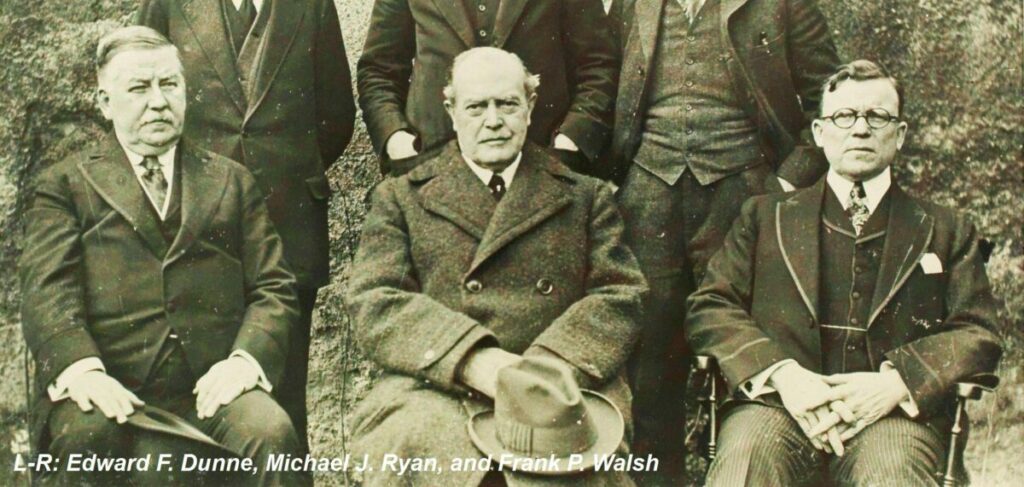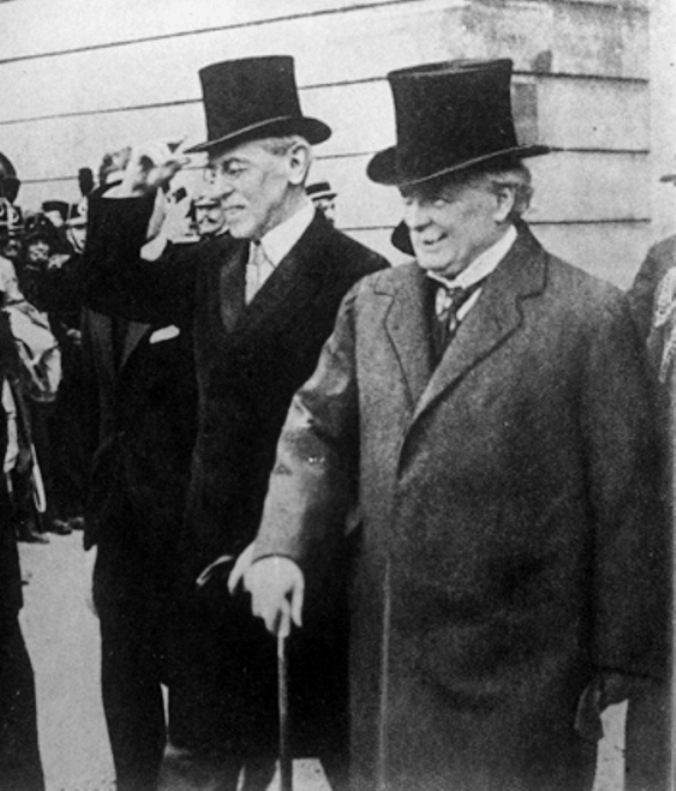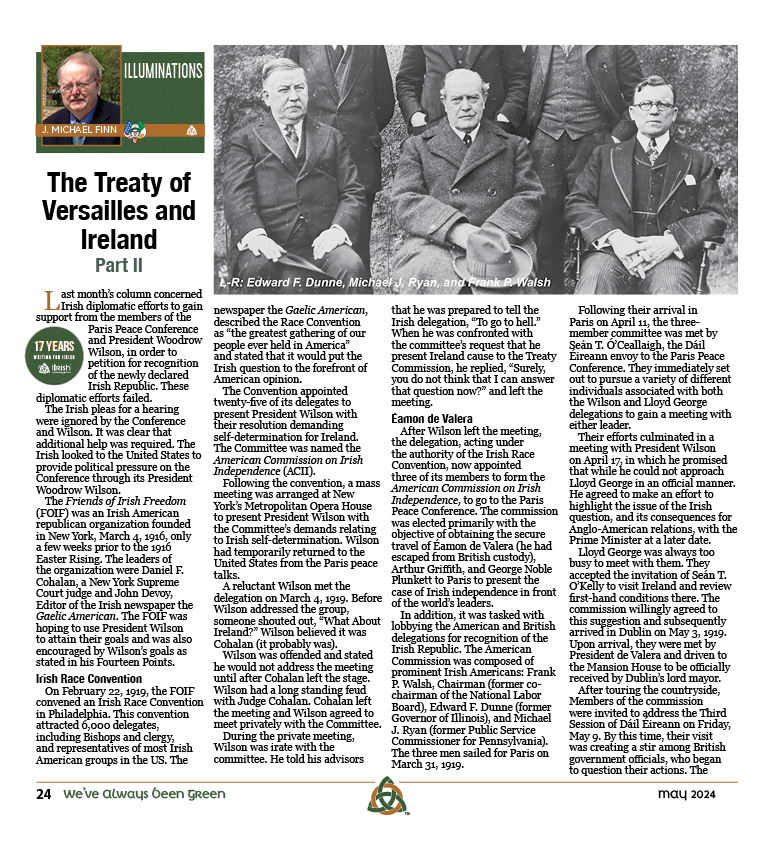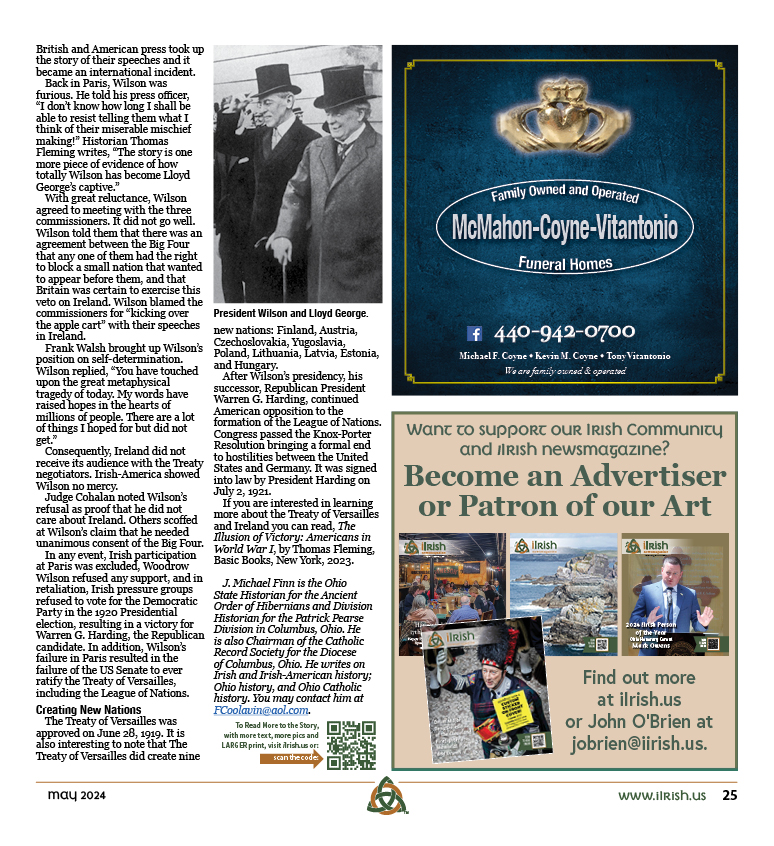
By Mike Finn
Last month’s column concerned Irish diplomatic efforts to gain support from the members of the Paris Peace Conference and President Woodrow Wilson, in order to petition for recognition of the newly declared Irish Republic. These diplomatic efforts failed.
The Irish pleas for a hearing were ignored by the Conference and Wilson. It was clear that additional help was required. The Irish looked to the United States to provide political pressure on the Conference through its President Woodrow Wilson.
The Friends of Irish Freedom (FOIF) was an Irish American republican organization founded in New York, March 4, 1916, only a few weeks prior to the 1916 Easter Rising. The leaders of the organization were Daniel F. Cohalan, a New York Supreme Court judge and John Devoy, Editor of the Irish newspaper the Gaelic American. The FOIF was hoping to use President Wilson to attain their goals and was also encouraged by Wilson’s goals as stated in his Fourteen Points.

Irish Race Convention
On February 22, 1919, the FOIF convened an Irish Race Convention in Philadelphia. This convention attracted 6,000 delegates, including Bishops and clergy, and representatives of most Irish American groups in the US. The newspaper the Gaelic American, described the Race Convention as “the greatest gathering of our people ever held in America” and stated that it would put the Irish question to the forefront of American opinion.
The Convention appointed twenty-five of its delegates to present President Wilson with their resolution demanding self-determination for Ireland. The Committee was named the American Commission on Irish Independence (ACII).
Following the convention, a mass meeting was arranged at New York’s Metropolitan Opera House to present President Wilson with the Committee’s demands relating to Irish self-determination. Wilson had temporarily returned to the United States from the Paris peace talks.
A reluctant Wilson met the delegation on March 4, 1919. Before Wilson addressed the group, someone shouted out, “What About Ireland?” Wilson believed it was Cohalan (it probably was).
Wilson was offended and stated he would not address the meeting until after Cohalan left the stage. Wilson had a long standing feud with Judge Cohalan. Cohalan left the meeting and Wilson agreed to meet privately with the Committee.
During the private meeting, Wilson was irate with the committee. He told his advisors that he was prepared to tell the Irish delegation, “To go to hell.” When he was confronted with the committee’s request that he present Ireland cause to the Treaty Commission, he replied, “Surely, you do not think that I can answer that question now?” and left the meeting.
Éamon de Valera
After Wilson left the meeting, the delegation, acting under the authority of the Irish Race Convention, now appointed three of its members to form the American Commission on Irish Independence, to go to the Paris Peace Conference. The commission was elected primarily with the objective of obtaining the secure travel of Éamon de Valera (he had escaped from British custody), Arthur Griffith, and George Noble Plunkett to Paris to present the case of Irish independence in front of the world’s leaders.
In addition, it was tasked with lobbying the American and British delegations for recognition of the Irish Republic. The American Commission was composed of prominent Irish Americans: Frank P. Walsh, Chairman (former co-chairman of the National Labor Board), Edward F. Dunne (former Governor of Illinois), and Michael J. Ryan (former Public Service Commissioner for Pennsylvania). The three men sailed for Paris on March 31, 1919.
Following their arrival in Paris on April 11, the three-member committee was met by Seán T. Ó’Ceallaigh, the Dáil Éireann envoy to the Paris Peace Conference. They immediately set out to pursue a variety of different individuals associated with both the Wilson and Lloyd George delegations to gain a meeting with either leader.
Their efforts culminated in a meeting with President Wilson on April 17, in which he promised that while he could not approach Lloyd George in an official manner. He agreed to make an effort to highlight the issue of the Irish question, and its consequences for Anglo-American relations, with the Prime Minister at a later date.
Lloyd George was always too busy to meet with them. They accepted the invitation of Seán T. O’Kelly to visit Ireland and review first-hand conditions there. The commission willingly agreed to this suggestion and subsequently arrived in Dublin on May 3, 1919. Upon arrival, they were met by President de Valera and driven to the Mansion House to be officially received by Dublin’s lord mayor.
After touring the countryside, Members of the commission were invited to address the Third Session of Dáil Éireann on Friday, May 9. By this time, their visit was creating a stir among British government officials, who began to question their actions. The British and American press took up the story of their speeches and it became an international incident.
Back in Paris, Wilson was furious. He told his press officer, “I don’t know how long I shall be able to resist telling them what I think of their miserable mischief making!” Historian Thomas Fleming writes, “The story is one more piece of evidence of how totally Wilson has become Lloyd George’s captive.”
With great reluctance, Wilson agreed to meeting with the three commissioners. It did not go well. Wilson told them that there was an agreement between the Big Four that any one of them had the right to block a small nation that wanted to appear before them, and that Britain was certain to exercise this veto on Ireland. Wilson blamed the commissioners for “kicking over the apple cart” with their speeches in Ireland.
Frank Walsh brought up Wilson’s position on self-determination. Wilson replied, “You have touched upon the great metaphysical tragedy of today.
My words have raised hopes in the hearts of millions of people. There are a lot of things I hoped for but did not get.”
Consequently, Ireland did not receive its audience with the Treaty negotiators. Irish-America showed Wilson no mercy.
Judge Cohalan noted Wilson’s refusal as proof that he did not care about Ireland. Others scoffed at Wilson’s claim that he needed unanimous consent of the Big Four.
In any event, Irish participation at Paris was excluded, Woodrow Wilson refused any support, and in retaliation, Irish pressure groups refused to vote for the Democratic Party in the 1920 Presidential election, resulting in a victory for Warren G. Harding, the Republican candidate. In addition, Wilson’s failure in Paris resulted in the failure of the US Senate to ever ratify the Treaty of Versailles, including the League of Nations.

Creating New Nations
The Treaty of Versailles was approved on June 28, 1919. It is also interesting to note that The Treaty of Versailles did create nine new nations: Finland, Austria, Czechoslovakia, Yugoslavia, Poland, Lithuania, Latvia, Estonia, and Hungary.
After Wilson’s presidency, his successor, Republican President Warren G. Harding, continued American opposition to the formation of the League of Nations. Congress passed the Knox-Porter Resolution bringing a formal end to hostilities between the United States and Germany. It was signed into law by President Harding on July 2, 1921.
If you are interested in learning more about the Treaty of Versailles and Ireland you can read, The Illusion of Victory: Americans in World War I, by Thomas Fleming, Basic Books, New York, 2023.
Find more Mike Finn’s Illuminations columns HERE





*J. Michael Finn is the Ohio State Historian for the Ancient Order of Hibernians and Division Historian for the Patrick Pearse Division in Columbus, Ohio. He is also past Chairman and Life Member of the Catholic Record Society for the Diocese of Columbus, Ohio. He writes on Irish and Irish-American history; Ohio history and Ohio Catholic history. You may contact him at [email protected]
ends



Monthly newsmagazine serving people of Irish descent from Cleveland to Clearwater. We cover the movers, shakers & music makers each and every month.
Since our 2006 inception, iIrish has donated more than $376,000 to local and national charities.
GET UPDATES ON THE SERIOUS & THE SHENANIGANS!